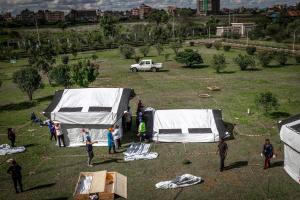Decommissioning as a strategic pillar in emergency preparedness and response
Nairobi ‒ Effective health emergency management must not only emphasize rapid deployment and operational delivery, but also prioritize the systematic decommissioning of temporary health infrastructure after a response. Temporary setups—like tents and modular clinics—are critical during emergencies, but they must be dismantled just as systematically as they are deployed.
Decommissioning involves dismantling structures, assessing residual supplies, identifying reusable items, and safely disposing of waste. When properly executed, it minimizes environmental contamination, infection risks, and waste—while reinforcing community trust, reducing costs, and supporting sustainability.
Neglecting this crucial phase risks resource loss, environmental damage, and missed opportunities for strengthening future preparedness. “Decommissioning is a core component of the emergency management cycle, yet it is often overlooked,” says Alex Yao Sokemawu Freeman, WHO Health Logistics Officer at the Nairobi hub. He advocates integrating decommissioning into early response planning and training frontline teams with practical SOPs. WHO’s decommissioning protocols now ensure safe closure is planned from the outset of any response.
A structured decommissioning process facilitates inventory tracking, safe reuse, and donation of supplies—promoting sustainable use of resources and reducing the environmental footprint. These practices build local capacity and autonomy in emergency health response.
Training in countries like Uganda, Malawi, and Zimbabwe has significantly improved WHO country office competencies in facility closure, inventory management, and waste disposal. In Uganda, WHO led a simulation training for 25 first responders, enhancing their skills in facility setup and decommissioning.
“Training emphasized step-by-step planning for decommissioning, including phased downscaling, identification of reusable items and adherence to decontamination protocols,” explains Depuydt, a WHO logistics expert. “We covered inventory management: tracking what’s reused, what’s donated, and to whom. Many items can be safely reused, benefiting health systems beyond the outbreak.”
This knowledge transfer also bolstered national ownership. “The training was really interesting,” reflects Daniel Thomas Opio, Uganda’s Emergency Medical Team Coordinator. “We had attempted setup before, but without training, there are things you miss. This training has grown my confidence.”
In Malawi and Zimbabwe, similar decommissioning sessions were integrated into the closure of cholera treatment centres. Over 50 responders were trained in inventory assessment, equipment storage, and waste handling. When Cyclone Chido struck Malawi in late 2024, followed by a cholera outbreak in 2025, local teams responded swiftly with minimal external assistance.
“I had so much growth from the hands-on training and mentoring,” notes Thokozani Chimbali, a trained WHO logistics officer. “I can call myself an ‘operations support and logistics all-rounder.’ I now manage local responses independently and can be deployed to regional emergencies.”
Dr Dick Chamla, WHO Nairobi Hub Coordinator, reinforces that decommissioning must be embedded in preparedness efforts: “This comprehensive approach prioritizes accountability, sustainability, and efficiency.” WHO continues to support countries in institutionalizing decommissioning to ensure emergency operations strengthen long-term health system resilience.
Conclusion
Decommissioning is not an afterthought—it is a strategic, essential component of health emergency responses. When integrated into preparedness frameworks, it supports environmental safety, resource efficiency, and national resilience.
As WHO experts underscore, embedding structured, phased decommissioning strengthens emergency outcomes, fosters sustainability, and transforms emergency interventions into long-term capacity-building investments.
Recommendations
- Integrate decommissioning into emergency response SOPs.
- Invest in responder training on decontamination, resource management, and waste disposal.
- Establish M&E systems to assess decommissioning outcomes and ensure continuous learning.
- Foster regional platforms for knowledge exchange and peer learning.



